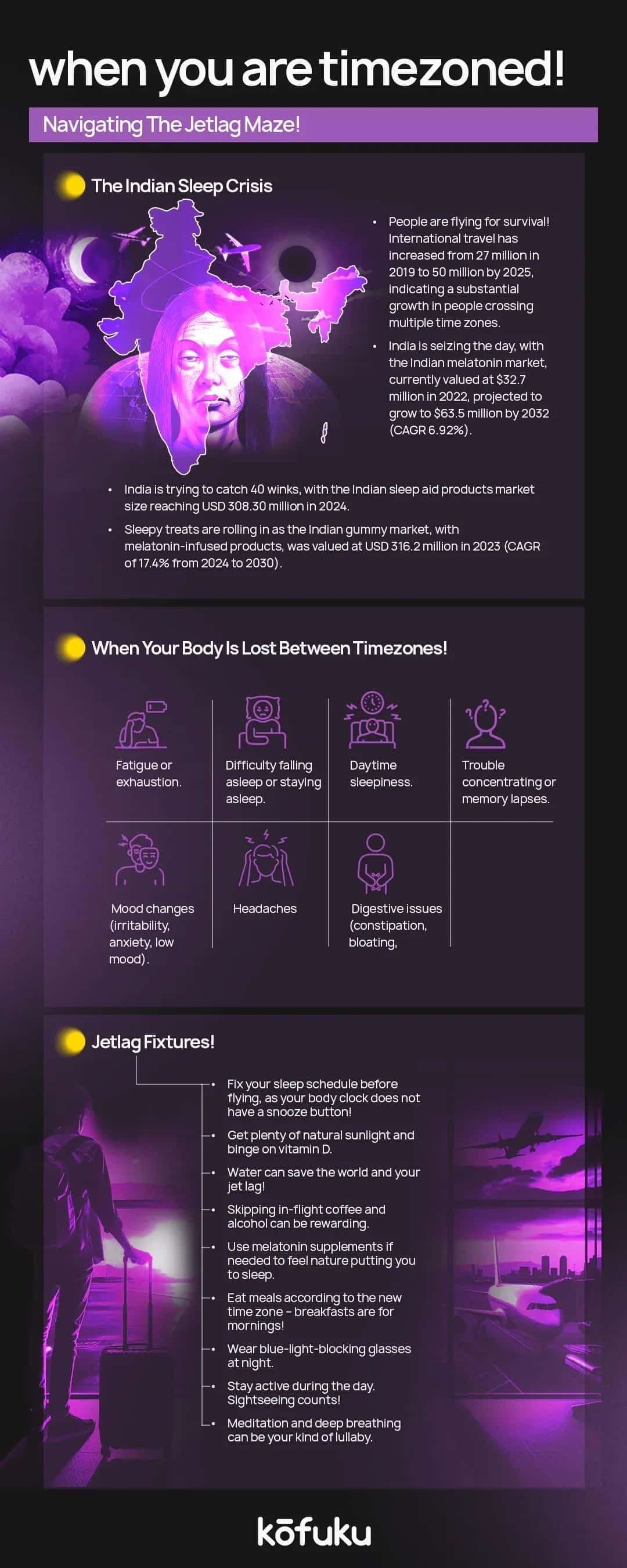Melatonin and Jet Lag – Explained

Introduction
The amount of travelling people are doing nowadays, you’d think flight tickets are free. Having said that, landing in a new country, excited to explore, is a vibe, really. Except that you find yourself wide awake at three o’clock in the morning.
Or worse, dozing off face-first in lunch. Introducing jet lag, an annoying side effect of modern long-distance travel, that messes up your body clock, energy levels and mood, just when they’re needed the most.
Jet lag goes beyond feeling tired. Think of it as a full-body rebellion brought about by rapid travel across different time zones, so much so that your internal circadian rhythm struggles to sync with local time.
Insomnia, daytime sleepiness, irritability, brain fog and digestive issues creep in, with general disorientation ruling the roost. For business travellers, this means a massive blow to productivity. For vacationers, it can mess up the first few precious days of a trip.
Many people turn to melatonin for relief. Melatonin is a naturally occurring hormone that regulates sleep-wake cycles. It is available as an OTC supplement, a popular remedy for helping the body come to terms quicker with new time zones.
But is melatonin the remedy for jet lag? How is it to be taken, and when? Does it work equally well for eastward and westward travel?
This blog will explore jet lag's science, melatonin's role, and practical strategies to mitigate its impact, all backed by research, statistics, and country-specific insights.
Whether you're a frequent flyer or a travelling novice, this guide will arm you with the knowledge you need to understand, prevent, and beat jet lag.
Decoding Jet Lag
Don’t let the name fool you. Jet lag, a temporary sleep disorder, happens when your body’s internal clock or circadian rhythm is thrown out of sync with the time zone of your travel destination.
This is quite common, when flying across three or more time zones, ruining the natural cycle of sleep, hunger, alertness and hormone release.
Signs of Jet Lag
-
Issues with falling or staying asleep.
-
Constant drowsiness coupled with daytime fatigue.
-
Memory issues or concentration problems
-
Headaches or feeling dizzy.
-
Bloat and nausea
-
Just generally feeling weird.
Such symptoms can be a little or very severe, and might last for a few days or up to a week, depending on the direction and distance of travel.
Circadian Rhythm - What Does That Mean?
Don’t let the name fool you. A circadian rhythm is a body’s 24-hour internal clock that is powered by a part of the brain known as the suprachiasmatic nucleus (SCN).
This clock dictates when you feel sleepy or alert by controlling the release of hormones, especially melatonin, which goes up in the evening to make you feel sleepy and drops in the morning so that you can wake up.
Heavily influenced by natural light, it acts as a time cue or “zeitgeber" that assists your body in staying in sync with the environment.
How Does Moving Across Time Zones Disrupt the Body Clock?
Travelling across different time zones, your internal body clock remains set to your home time - which means it might be either ahead or behind. This mismatch results in confusion in your biological processes, resulting in sleep disturbances and other symptoms.
Travelling East Vs Travelling West
As a rule, travelling towards the east is tougher on the body than travelling towards the west. This is because when you travel east, your day shortens, and it gets tougher and tougher for your body to try to go to sleep earlier than to delay it (stay up later), which is needed when you’re heading west.
What Are the Consequences of Doing This?
Mostly, jet lag goes away in a few days. However, when it is chronic or frequent, like in the instance of frequent flyers or shift workers, there are long-term consequences, like
-
Poor immune function
-
Bad mental performance
-
One too many metabolic issues
-
Mood disturbances and burnout
Decoding the meaning of jet lag and studying its effect on the body is the primary step towards managing and finally beating it. Next, let’s see how melatonin fits in the picture, shall we?
Melatonin? What Is That?
Melatonin is a naturally occurring hormone in the human body that regulates the sleep-wake cycle. Often known as the sleep hormone, melatonin signals the body that it is time to wind down and give it a break!
Where Does Melatonin Come From?
Ever heard of the pineal gland? It’s a tiny pea-shaped structure found deep in the centre of the brain, right above the middle of the brainstem.
The gland is tiny, yes, but that’s all that is minuscule about it. The role that it plays in managing the internal clock of the body, known as the ‘circadian rhythm’, is huge.
Melatonin and the Circadian Rhythm
The ‘circadian rhythm’ is an internal 24-hour cycle that regulates different biological processes, including sleep, hormone release, metabolism and body temperature. Melatonin helps control this rhythm by rising and falling at different times during the day.
2-3 hours before your natural bedtime, melatonin levels start to rise in the evening. Peaking during the night, they help you fall asleep and stay asleep. As morning gets closer, melatonin levels fall, prompting your body to rise and feel alert.
This constant rise and fall of melatonin basically tells your body when it’s time to sleep and when it’s time to rise.
Light and Melatonin Secretion
Light exposure plays a huge role in the production of melatonin, especially blue light from the sun or digital screens. Light gets detected by special retinal cells, which transport signals to the brain’s suprachiasmatic nucleus (SCN), also known as the master clock of the body.
When evening comes about, light levels fall, and the SCN informs the pineal gland to release melatonin.
Having said that, exposure to bright light, especially in the evening, can hamper melatonin production, delaying sleep and ruining your natural sleep rhythm.
This is especially true when you look into the role of jet lag, where light exposure in a new time zone might be misaligned with your internal clock.

Why Does Melatonin Matter?
Okay, let’s get this out of the way. For those of you who are asking, melatonin is not a sedative. Think of it as a time cue or chronobiotic, which means it helps alter the timing of your biological rhythms.
Its importance lies in its ability to signal to the body that it is time to sleep, preparing you for restful sleep. In the absence of proper melatonin signals, your body will find it an uphill task, to maintain a stable sleep pattern, especially after rapid travel, across different time zones.
Melatonin and Jet Lag - The Story You Need To Know
Melatonin has become the go-to remedy for jet lag and with good reason. Whether produced naturally by our body, or ingested as a supplement, melatonin helps reset your internal clock, making it easier to fall asleep, stay and awake refreshed in a new time zone.
How Melatonin Works
Often described as a “hormonal signal of darkness”, melatonin is released by the pineal gland, when it gets dark, telling your brain “hey, time to go rest”. This process helps shift the timing of your circadian rhythm - the internal clock of your body.
When you cross different time zones quickly, as in long-haul flights, your internal clock stays aligned to your original time zone. This results in a mismatch between your sleep-wake cycle and the local time at your destination.
Supplementing with melatonin can artificially trigger “night-time” in your body, assisting in adapting to the new time zone, quicker.
In short - melatonin works by
-
Shifting your circadian rhythm phase - helping to advance or delay the internal clock, depending on when it gets taken.
-
Reduce sleep latency - helping you to fall asleep faster.
-
Boosting sleep efficiency and quality - promoting better, more restful sleep, no matter how disrupted your schedule is.
Research and Clinical Evidence
There are many studies that have pointed at melatonin’s effectiveness in bringing down the duration and severity of jet lag.
-
Clinical trials have proven that taking melatonin right before you sleep brings down sleep onset latency and boosts sleep quality.
-
Some studies also pointed towards better daytime alertness, cognitive function and mood, in travellers who used melatonin strategically.
Natural vs Supplemental Melatonin
While your body creates melatonin naturally, supplemental melatonin offers a way to “manually” shift your biological night. The supplement is available in both immediate-release (for falling asleep quickly) and extended-release (for staying asleep) forms.
Natural melatonin production is influenced by environmental factors like light and time of day. However, artificial lighting, poor sleep schedules, or rapid travel can spoil this. \
Enter supplemental melatonin, that bypasses these environmental influences and provides your brain the signal that it requires - when it requires it.
Going beyond sleep
Melatonin just does not impact sleep. It realigns your circadian rhythm and -
-
Boosts alertness and brings down daytime fatigue.
-
Improves mood stability
-
Brings down grogginess and cognitive sluggishness.
-
Stabilises gastrointestinal rhythms, which are also offset by changes in time zone.
This makes melatonin great for sleeping better, but also feeling more alert, focused and emotionally balanced - when you travel.
Timing and Dosage: How to Use Melatonin for Jet Lag
Melatonin can be great if you want to reset your body clock while travelling - but only if used in the proper way.
The dosage, timing, and the duration of melatonin supplementation can differ depending on the direction of travel and the number of time zones crossed.
Breaking it down further -
When to take melatonin - Eastward vs Westward Travel
The direction you fly influences how you use melatonin:
Eastward travel (e.g., India to Japan or India to Europe)
You’re moving ahead in time, which implies that your body has to fall asleep a little earlier than usual. Ingest melatonin in the early evening (local destination time) —usually between 6:00 PM and 8:00 PM–to advance your body clock.
Westward travel (e.g., India to the US or India to the UK)
You are gaining time, and your body has to stay awake longer. Ingest melatonin late night (local destination time), usually between 9:00 PM and 11:00 PM - to help delay your sleep cycle, albeit slightly.
Sample Travel Scenarios
India to the US (westward, 10–12 hour difference):
Ingest melatonin around 9:30–10:30 PM, destination time, beginning on the day of arrival and carry on for 3-4 days.
India to Europe (eastward, 4–5 hour difference):
Ingest melatonin around 6:30–7:30 PM destination time for 3–5 days to assist in shifting your sleep schedule earlier.
US to India (eastward, ~10.5 hours):
Ingest melatonin in the early evening, Indian time, starting the day you land, and carrying on for 4–5 nights.
Typical Dosages:- 0.5 mg to 5 mg.
Low doses (0.3–1 mg):
Mimic natural melatonin levels. These are mostly sufficient for circadian rhythm adjustment and are not as likely to result in grogginess.
Moderate doses (2–3 mg):
Mostly implemented to help both sleep initiation and phase shifting.
Higher doses (5 mg):
This might be useful for short–term use but can result in side effects like vivid dreams, next-day drowsiness or headaches.
Half-Life and Bioavailability
Melatonin has a short half-life of 30–60 minutes, which is why timing matters.
Immediate-release formulations assist you in falling asleep quickly.
Extended-release versions mimic the body’s overnight production, but might not help as much when it comes to circadian shift.
How Long Can We Use It
For most travelers, melatonin must be taken 2–5 days after arriving at your destination. In certain cases, like major international trips with 8+ time zone changes, you can begin taking it 1-2 days before departure, to help pre-adjust your body clock.
Caution - Don’t Go Overboard - (e.g., morning or mid-day) can actually exacerbate jet lag by confusing your internal clock even more.
Also, taking too much melatonin can result in side effects like mood changes, brain fog and interrupted sleep cycles.

How Do You Support Your Body Clock (With or Without Melatonin)
Granted - melatonin is great for jet lag, but combine it with smart lifestyle strategies that support your body’ circadian rhythm, and you’re setting it up for the win. Whether you are using melatonin or not, such methods can ease your transition across time zones
Ensure Good Sleep Hygiene
Before, during and post the trip, create an environment that supports restful sleep:
-
Blackout curtains or eye masks, help filter unwanted light, especially in places where sunrise occurs earlier or later than you are used to.
-
Blue light blocking glasses or apps bring down exposure to screens prior to bed, so your body can produce melatonin naturally.
-
Make sure your sleep space is cool, dark and quiet for proper comfort.
Slowly Adjust Your Schedule Before Travel
A couple of days prior to departure, begin shifting your sleep and wake times towards the time zone of your destination. Even a 30–60 minute adjustment per day can bring down jet lag symptoms.
-
For travelling east - sleep and wake up earlier.
-
For travelling west - stay up and wake up later.
Use Strategic Light Exposure
Light is the most potent tool for resetting your circadian rhythm:
-
Morning sunlight helps advance your body clock (best for eastward travel)
-
Evening light exposure helps delay your body clock (best for westward travel).
-
Light therapy lamps that can be used in places where natural sunlight is scarce.
Eat With the Local Time Zone
Line up your meal schedule with your destination, to help adjust your internal clock. Keep away from heavy meals before you sleep and pick light, easily digestible foods when evening comes.
Hydration and In-Flight Habits
Stay well hydrated, stay away from alcohol and caffeine, and don’t sleep too much during the flight, unless it matches with your destination’s night time.
Melatonin vs Other Jet Lag Remedies
While melatonin has gained importance as a natural jet lag remedy it just happens to be one of many strategies that travelers use.
Sleeping Pills (Z-drugs, Antihistamines)
Prescription sleeping pills such as zolpidem (Ambien), or over-the-counter antihistamines (like diphenhydramine) can bring about sleep during travel. Beware, however - they don’t reset the circadian clock - they will just sedate you.
Melatonin, on the other hand, supports the natural rhythm of the body, and is non-habit-forming when used properly.
Caffeine - Temporary Alertness
Certain travelers resort to caffeine to stay awake during daytime hours in a new time zone. While caffeine can bring about temporary alertness, it doesn’t tackle the root cause of jet lag and can worsen sleep if taken at an inappropriate time.
Melatonin works oppositely - by resetting the circadian rhythm, not just covering up symptoms.
Herbal Alternatives
Herbs like valerian root, passionflower, chamomile are used to boost relaxation or sleep but evidence on their efficacy for jet lag is limited. They might assist with general sleep issues but don’t influence circadian phase shifts like melatonin does.
Jet Lag Apps and Behavioural Strategies
Apps like Timeshifter or Entrain, depend on algorithms to suggest personalised light exposure, melatonin schedules and sleep timing. Such tools work best in conjunction with melatonin or natural strategies, for tackling jet lag.
Conclusion
Melatonin can be your best friend in bringing down jet lag - when used correctly. It works best as part of a holistic strategy customised to your travel direction, personal sleep patterns and timing.
It is however not a one-size-fits-all fix, and too much of it, or incorrect timing can make things go wrong. Always speak to a doctor, especially if you travel a lot or take other medications.
If you have the optimum approach, you can bring down jet lag and arrive feeling refreshed, alert and ready to enjoy your destination.
FAQs
Q. What is jet lag?
A. Jet lag is a temporary sleep disorder that happens when your internal body clock is out of sync with the local time at your travel destination.
Q. What causes jet lag?
A. Jet lag is caused by crossing multiple time zones rapidly, which throws off your circadian rhythm — your internal 24-hour body clock that controls sleep, hormones, digestion, etc.
Q. Why is travelling east harder than west?
A. Because your body finds it easier to stay up late than to fall asleep earlier. Eastward travel shortens your day (harder to adjust), while westward travel lengthens it (easier to adapt).
Q. What is melatonin?
A. Melatonin is a hormone made by your brain’s pineal gland that helps regulate your sleep-wake cycle.
Q. Can melatonin help with jet lag?
A. Yes. Supplemental melatonin can help reset your internal clock to match the new time zone, reduce the time it takes to fall asleep, and improve sleep quality.





